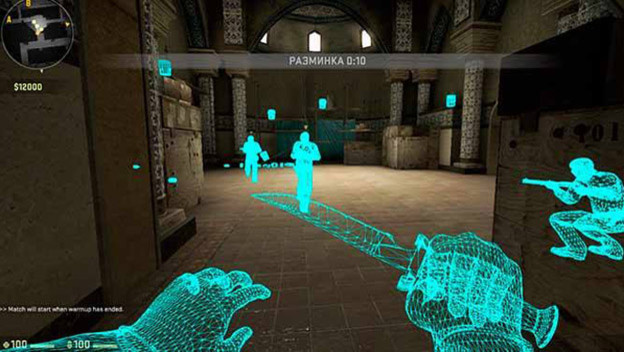I may have been writing for the site for approximately two years now, but I’ve known of it ever since the early 2000s, when I was trying to find out how to bring Aeris back to life in Final Fantasy VII (it’s impossible, but I kept returning anyway). I suppose it was inevitable that I would join the other members of the gaming community, be forced to face my past as a cheater, and answer these questions: why do I cheat in video games? Why do we cheat in video games? What compels Cheat Code Central’s Matthew Hayes to ruin your kill to death ratio in Counterstrike by using wall hacks? [Note: All in good fun, I picked a random staff member to pick on.]
Well, conveniently enough, there are quite a few articles and studies on the topic, although I’m certain that more light will be shed in time. In the meantime, here are a few of the interesting points I’ve found.
We Cheat When the Opportunity Arises
According to Pscyhologyofgames.com , cheaters tend to cheat whenever the opportunity arises. For instance, researchers at Stanford University asked their participants to flip coins in the safety of their own homes, and self-report, which alone could skew results, the amount of times the quarter landed on heads. Their incentive is that for every time the coin landed on heads, they received a dollar. The researchers divided participants into two groups, and gave each group one of the following requests:
1. Please don’t cheat.
2. Please don’t be a cheater.
As you can imagine, self-reporting from home means provides ample opportunity for cheating, but one of these groups was bound to cheat more than the other, and that group is the first. Like a teenager told to be home by curfew, these participants were too driven by rewards to care about the request, so they reported a higher percentage of successful coin flips. Interestingly, the latter group, although given seemingly similar instructions, were less likely to cheat because the request addressed their consciences; I’m sure you can accurately guess to which group Matthew Hayes belongs.
So even if we’re more likely to cheat when we self-report our results, shame might keep some from cheating. That said,
It’s a Cheat or Be Cheated on World
Look, I’m also not an innocent gamer; I’ve looked at the corners of the television screen to gauge my friends’ location in Goldeneye 64 just like the worst of them. But we live in a world where, according to Wired , everyone expects the worst out of the strangers they play against online. You might not want to cheat, but you have no idea if Matthew Hayes (who undoubtedly grows a Snidely Whiplash mustache so he can twirl it around and laugh while plotting cheap tricks he’ll pull on unsuspecting gamers like yourself), is going to cheat, so you decide to cheat in anticipation of his cheating. Well, before you turn to the dark side, consider this next point:
You Can Deter Cheating By Establishing an Honor Code
According to the same Wired article, policing your community is the key to deterring cheating. Gamers tend to cheat more when playing with strangers, and an online community helps people create bonds. Prominent members may take on bigger roles in which they ban players who refuse to conform to standards, so you can rest assured that you won’t have to deal with Matthew for long if he happens to join your game.
With your friends, your rules can probably just be agreed upon before playing, although let’s face it – your friends are dicks, and either you’re going to get into an overblown fight with them during a match, or you’re going to accept them for who they are. Still, the psychology is there: agree upon some rules, and everyone (should) be on their best behavior.

In Conclusion, Cheating Is Neither Good Nor Evil
I suppose now’s the time in which I must apologize to Matthew Hayes, because it turns out that everyone cheats, and it’s not as bad as we perceive it to be. Where you draw the line in cheating while playing a videogame is a lot like morality: it’s different depending on cultures and individuals.
Of course, some people really do just want to ruin your day and favorite online game by association, but others, well, see no other option. If someone paid $40 for The Witness, which is known for its difficulty as a puzzle game, becomes stuck, yet wants to see it through to the end, then why not consult guides on Cheat Code Central or YouTube?
Perhaps you know a game like the back of your hand, and want to prolong your experience with it. Why not spice up your gaming session by exploiting loopholes? Cheating can actually be good for us from a consumer standpoint, because it allows us to prolong our time with a game while approaching it from a different, admittedly sometimes dastardly, perspective. Regardless of why we cheat, we should determine our boundaries.
